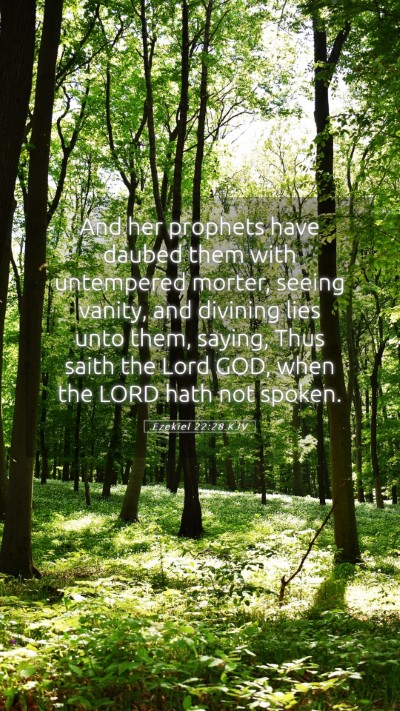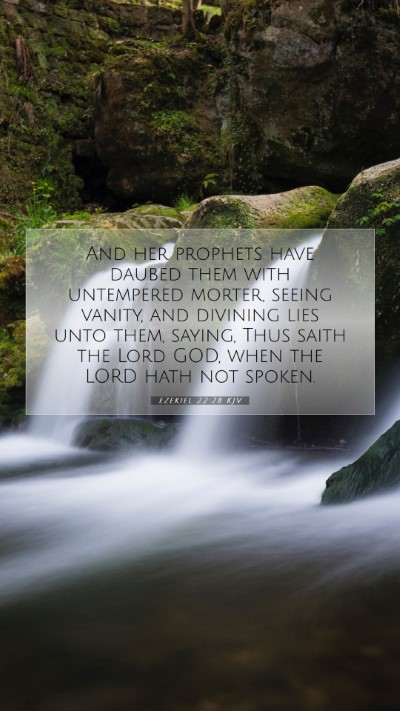Ezekiel 22:28 - Bible Verse Meaning and Interpretation
Bible Verse: Ezekiel 22:28 - "And her prophets have daubed them with untempered mortar, seeing vanity, and divining lies unto them, saying, Thus saith the Lord God, when the Lord hath not spoken."
Overview of Ezekiel 22:28
This verse highlights the responsibility of the prophets in Israel, emphasizing their failure to communicate God's true message. They have misled the people with false prophecies and assurances. The imagery of "untampered mortar" suggests a superficial and unreliable foundation for their teachings. This reflects a significant theme in the Book of Ezekiel, where the prophet confronts the spiritual corruption in Israel.
Insights from Commentaries
Matthew Henry's Commentary
Matthew Henry notes that the prophets were to have revealed God’s truths to the people but instead succumbed to falsehoods. Their messages, devoid of real divine endorsement, signify a severe decay of spiritual integrity within Jerusalem. Henry states that such misleading guidance leads to spiritual and societal chaos, indicating a grave disconnection from God.
Albert Barnes' Commentary
Albert Barnes emphasizes the imagery of "daubing with untempered mortar," illustrating how these prophets offered a false sense of security. He explains that "untempered" suggests a lack of genuine substance or strength. Barnes argues that the prophets claimed divine approval for their messages when in fact they were fabrications. This leads to a dangerous assumption among the people that they are secure in their actions, fostering complacency and false hope.
Adam Clarke's Commentary
Adam Clarke discusses the context and implications of the false prophecies. He notes the significance of “seeing vanity” and “divining lies,” indicating that these prophets were not only deceiving others but were also aware of their falsehoods. Clarke points out that this betrayal of their calling as prophets poses moral and spiritual challenges to the community, fostering distrust and leading them away from true repentance.
Key Themes
- False Prophecies: The verse highlights the danger of false teachings within the spiritual community and their consequences.
- Moral Responsibility: It emphasizes the moral responsibilities of prophetic figures in communicating God's word accurately.
- Consequences of Deception: It warns against the consequences of fostering lies and the impact they have on community faith and actions.
Application in Modern Faith
The themes from Ezekiel 22:28 remain pertinent for today's believers. Understanding the weight of prophecy and teachings underscores the importance of sound doctrine in church leadership. This verse serves as a reminder for both leaders and followers to ensure that their teachings align with Scripture to avoid spiritual disillusionment.
Related Bible Cross References
- Jeremiah 14:14 - Discusses false prophets and their misleading messages.
- Lamentations 2:14 - Highlights the misguidance offered by false prophets and its implications.
- Ezekiel 13:10-11 - Describes the practice of misleading the people with weak foundations in prophecy.
Conclusion
In summary, Ezekiel 22:28 serves as a critical reminder of the integrity required in prophetic ministry. As believers seek to understand Scripture, this verse calls for careful discernment in following teachings that claim divine authority. When engaging in Bible study, individuals may consider the implications of such verses for personal faith and community dynamics.


